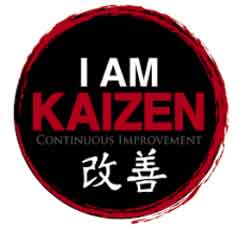The following column comes through special arrangement with the Lean Enterprise Institute. It was authored by Matt Savas, the organization's Community Resource Manager. It is based on a recent trip made to study Lean in Japan.
Today, the learning group wrapped up its week of going to gemba. In the morning, we visited a tier 1 supplier of body and chassis parts called Toyo Tetsu. We spent 90 minutes on the floor observing both welding and stamping operations. We followed kanban cards - withdrawn every 30 minutes - from the heijunka post upstream to welding where they provided production instruction. We ended at a transfer press to observe a 131-second changeover. Lead time from production to ship was 4.5 hours. It is always striking to observe how suppliers demonstrate production capability equal to Toyota's.
Supply Chain Digest Says... |
 |
| A tour participant captured it wonderfully: "To Toyota, kaizen is the same as breathing." |
 |
What do you say? |
| Click here to send us your comments |
 |
| Click here to see reader feedback |
|
|
The final point Toyota left us with was about people. The GM of production wrote on the whiteboard four Japanese words that share a common pronunciation - jinzai. They are translated as:
• Human Asset
• Human Resource
• Human Existence
• Criminal
There are four ways a company can manage its employees, one for each of the above concepts:
Human Asset: Every employee is making a positive contribution to the organization and the company is making investments in its people to enable that contribution
Human Resource: Employees have a generally positive attitude and the company provides a good environment in which to work
Human Existence: The company asks only for its worker' hands and not their brains; workers come to work just to work
Criminal: Low performing companies that companies tolerate because they struggle to attract higher performing workers and develop people.
The general manager said most companies fall into the human existence bucket. They ask just for their workers' hands and not their brains. Toyota Motor Kyushu, on the other hand, strives to make every employee an asset.
We observed this all week. Indeed, it was genuinely difficult to discern whether Toyota is a car manufacturer or a people developer. Of course, they're both. Every day Toyota asks for - and receives - not just its worker's hands but their brains.
For the first couple days of the week we asked Toyota questions about kaizen:
"How do you prioritize ideas from operators?"
"How do you decide which ideas to implement?"
"How do you calculator ROI on an idea?"
(Article Continued Below)
|
CATEGORY SPONSOR: SOFTEON |
|
|
| |
|
|
 Their response was always confusion. They genuinely didn't understand the questions. Kaizen is not something to evaluate in an office. Kaizen is something you just do on the floor - all the time. Their response was always confusion. They genuinely didn't understand the questions. Kaizen is not something to evaluate in an office. Kaizen is something you just do on the floor - all the time.
By day three, it became clear. A tour participant captured it wonderfully: "To Toyota, kaizen is the same as breathing."
Here are a few of the lessons learned by our members on the trip:
"Communication with front line leaders is the key to getting buy-in. Get them to understand the importance and effectiveness of kaizen and they will get the message to the team member. If you do not hit your target condition, it's not a failure. Kaizen again."
"Improving the work is the work."
"Transparent and continual communication with the frontline is essential in building trust."
"It was great to revisit reaching the line worker and hearing the top management say the key is to double down on your effort to reach, listen, communicate, and engage with your people."
"No matter how good you are with kaizen attitude there is always something to work on. Pursue perfection! You can always be better. That is not a knock on where you are but a great opportunity of where you can go. Measure yourself not against what others say but where you want to be."
Do most companies under utilize their human resources? Why? Let us know your thoughts at the Feedback section below.
Your Comments/Feedback
|